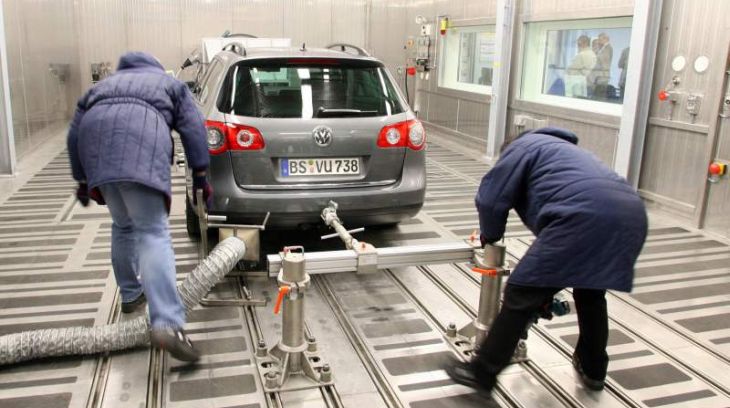The European Transport Forum opened on Tuesday, after a week dominated by headlines over the Volkswagen scandal, writes Euractiv.com. The revelations that Volkswagen, the world’s second largest car manufacturer, had routinely gamed US emissions testing have thrown the spotlight on the environmental and health impact of cars.
While EU member states, such as the UK, open or consider investigations into the beleaguered company, European Commission officials are currently reviewing the executive’s 2011 White Paper for transport, its main policy roadmap for the sector. Bringing extra impetus to their deliberation is the upcoming UN Climate Change Conference in Paris, international talks aimed at capping global warming.
Decarbonisation
Transport, which includes fuel sold for international aviation and shipping, accounts for a quarter of greenhouse gas emissions in Europe, according to the European Environment Agency. It is the second biggest contributor after the power sector, with cars making up the single largest source of emissions.
The decarbonisation of the transport sector was cited in the EU’s Energy Union blueprint, but details were scant. In 2016, the executive is expected to launch a communication on bringing down CO2. It is possible the package will include 2025 reduction targets for car CO2 emissions.
As MEPs, industry leaders and politicians meet in Brussels for the forum; EU officials are undertaking a review of its white paper on transport that will feed into the communication. While the forum’s theme is ensuring a reliable, safe and secure transport system, the Volkswagen scandal has ensured that emissions will be very much on policymakers’ minds.
Current EU vehicle emission standards are obsolete. Today’s knowledge of the impact of air pollution on human health, particularly nitrogen oxides, has revealed that not all dangerous gases are controlled. And there is no limit on methane emissions from cars, despite the fact that the greenhouse effect of the gas is 23 times stronger than that of CO2.
Lorries catching up
But cars are not the only form of transport that release CO2 emissions. Lorries are catching up and by 2030 are predicted by NGO Transport and Environment to rival cars’ share of greenhouse gases. Projections show lorries and buses will account for 41% of road transport’s climate emissions by 2030, rivalling cars’ share of 47% due to EU efficiency targets for passenger vehicles.
Trucks and buses currently make up less than 5% of vehicles on the road, but emit 30% of road transport’s CO2 emissions, according to research by Transport & Environment, a pressure group, which based its calculations on EU figures.
2030 is a particularly relevant date. In October last year, EU leaders agreed to cut greenhouse gas emissions by at least 40% by 2030. That commitment forms the cornerstone of the bloc’s negotiating position for the UN climate talks, which aim to limit global warming to no more than two degrees above pre-industrial levels.
Britain, Belgium, the Netherlands and Slovenia told the European Commission in June that limits on lorry CO2 emissions were required if the EU is to meet its 2030 climate targets. Earlier this month, the European Parliament echoed that demand in a plenary vote, while Germany’s Federal Environment Agency also called for lorry CO2 reduction targets last month.
“CO2 car, van and truck standards for 2025 are a logical and essential element of Europe’s efforts to achieve its 2030 climate targets. A 2025 goal will also save drivers money, create jobs and reduce expenditure on imported oil – a win-win for the EU economy and environment,” said a T&E spokesman.
“Half the current 2021, 95g/km goal is not being met on the road due to manipulation of laboratory tests. A 2025 goal will help to deliver the intended emissions reductions with plentiful technology available, notably hybrids and light weighting vehicles.”
Aviation and shipping
But it is not only cars, trucks and buses that contribute to CO2 emissions. Far more controversial and difficult to regulate is international aviation and shipping. At present, intra-EU flights are covered by the bloc’s Emissions Trading System (ETS). From next year, the ETS is supposed to ‘snap back’ to covering all flights to and from Europe – which will prove hugely controversial with countries outside Europe.
The EU is waiting for feedback from the aviation industry to develop a market-based mechanism that would reduce CO2 from aviation. But any measure to reduce emissions from any transport sector will be heavily scrutinized.
The Volkswagen scandal has thrown the credibility of all sectors on emissions into doubt in the year of the 2015 UN Climate Change Conference. This week’s Transport Forum is an opportunity for the industry to demonstrate it is serious about mitigating its climate impact, at a time when its commitment to that goal is very much under the microscope.
